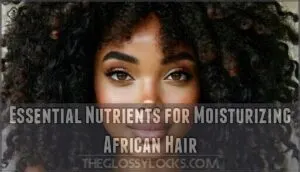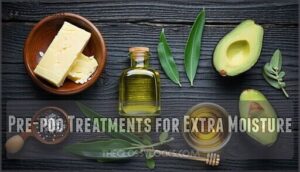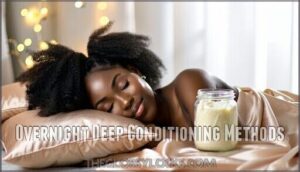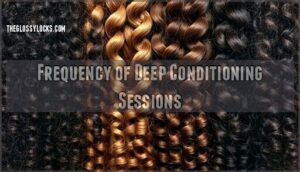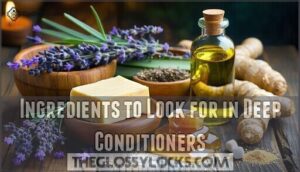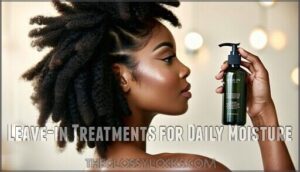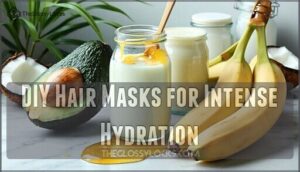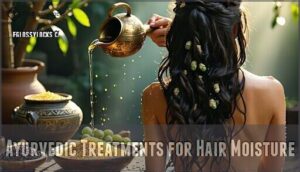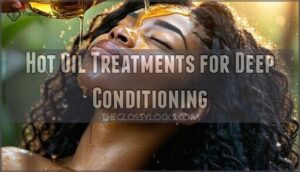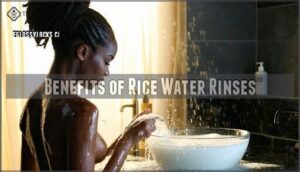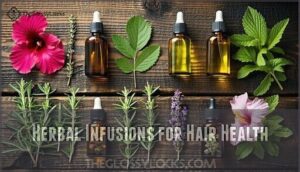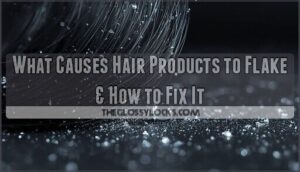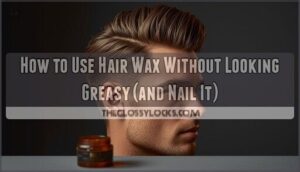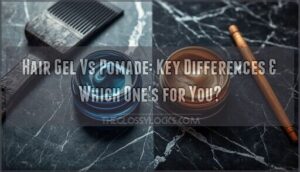This site is supported by our readers. We may earn a commission, at no cost to you, if you purchase through links.
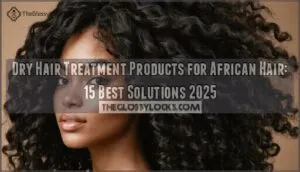
The best dry hair treatment products for African hair combine deep moisturizers with natural oils like shea butter, coconut oil, and argan oil.
Look for leave-in conditioners with ceramides and glycerin, which lock in moisture for days.
Weekly deep conditioning masks containing proteins rebuild damaged cuticles while maintaining flexibility.
Your hair craves hydration like a sponge craves water – feed it consistently with water-based products followed by oil sealants.
The secret isn’t just what you use, but how you layer these treatments for maximum penetration.
Table Of Contents
- Key Takeaways
- Causes of Dry African Hair
- Essential Nutrients for Moisturizing African Hair
- Deep Conditioning Techniques for African Hair
- Leave-in Treatments for Daily Moisture
- Natural Remedies for Extremely Dry Hair
- Frequently Asked Questions (FAQs)
- What is the best treatment for dry black hair?
- What do Africans use to moisturize their hair?
- How do I hydrate my afro hair?
- What is the best hair treatment for extremely dry hair?
- How do you treat dry African hair?
- What products to use to moisturize natural black hair?
- What is the best treatment for really dry hair?
- How often should I deep condition my African hair?
- What are the best oils for locking in moisture?
- Can I use these products on colored or relaxed hair?
- Conclusion
Key Takeaways
- Layer your products strategically – Apply water-based moisturizers first, then seal with natural oils like shea butter or coconut oil to lock in hydration and prevent moisture loss throughout the day.
- Deep condition weekly without fail – Your hair’s unique structure requires intensive moisture treatments every 7 days using protein-rich masks and steam treatments to rebuild damaged cuticles and maintain flexibility.
- Choose sulfate-free products designed for your hair type – Look for leave-in conditioners with ceramides and glycerin that won’t strip your hair’s natural oils while providing long-lasting moisture retention.
- Protect your investment with consistent nighttime routines – Use satin bonnets or pillowcases, apply overnight treatments, and mist regularly to maintain hydration between wash days and prevent environmental damage.
Causes of Dry African Hair
Your hair’s natural structure makes it prone to dryness, but understanding the root causes can help you choose the right treatment products.
From environmental stressors to styling habits, several factors work against your hair’s moisture balance and require targeted solutions.
Environmental Factors Affecting Hair Moisture
Why do environmental factors wreak havoc on your hair’s moisture levels? Your strands face constant assault from nature’s elements, each one stripping away precious hydration.
Here’s how your environment sabotages your hair’s moisture:
- Humidity Effects – High humidity causes frizz and cuticle swelling, while low humidity strips moisture, leaving hair brittle
- UV Protection needs – Sun exposure degrades hair proteins and reduces natural shine-giving compounds
- Air Pollution buildup – Pollutants penetrate your scalp, deplete keratin, and trigger dryness and breakage
- Water Quality issues – Hard water minerals and chlorine alter texture, cause color fading, and increase dryness
- Temperature Control challenges – Cold air and indoor heating severely reduce ambient humidity
Understanding hair health factors is essential to developing effective dry hair treatment strategies.
Your hair’s porosity makes it especially vulnerable to these environmental stressors, demanding targeted dry hair treatment strategies.
Impact of Heat Styling on Hair Dryness
Heat styling isn’t just damaging your hair—it’s literally stealing moisture from every strand. When you blast your locks with high temperatures, you’re breaking down the protein structure and cracking those protective cuticles that keep moisture locked in.
Heat styling literally steals moisture from every strand, cracking protective cuticles that lock in hydration.
Your styling tools might give you that smooth finish, but they’re also setting you up for serious hair breakage and chronic dryness.
Here’s what heat damage really looks like:
- Brittle strands that snap at the slightest touch
- Frizzy texture that defies your best hair moisturizer
- Dull, lifeless appearance that screams "help me!"
- Split ends that keep traveling up your hair shaft
Understanding the effects of heat styling damage is essential for preventing long-term harm.
Smart thermal protection and dryness prevention start with quality dry hair treatment products designed for African hair care.
Genetic Predisposition to Dry Hair
Your genes carry the blueprint for your hair’s moisture levels, making genetic predisposition a key factor in dryness causes.
Your African hair structure features tighter curl patterns that naturally trap less moisture along the shaft.
| Genetic Factor | Impact on Dryness | Hair Care Focus |
|---|---|---|
| Curl pattern | Restricts oil distribution | Dry scalp treatment |
| Follicle shape | Creates moisture barriers | Hair moisturizer application |
| Sebum production | Reduced natural oils | African hair care routine |
| Hair texture | Increased porosity | Dry hair treatment frequency |
Understanding your African roots helps you choose targeted products that work with your unique hair structure.
Role of Diet in Hair Health
Your plate influences your hair’s health more than you’d think.
Poor food intake creates a domino effect—mineral deficiency weakens strands while inadequate nutrient balance leaves African hair parched.
Hair supplements can bridge gaps, but whole foods work best for hair growth.
- Vitamin Role: Iron-rich foods like spinach and lean meats boost circulation to your scalp, while biotin from eggs strengthens hair structure for better hair hydration and reduced breakage.
Effects of Chemical Treatments on Hair
Chemical treatments like hair relaxers, bleach effects, and perm treatments break down your hair’s protective barriers, causing severe chemical damage.
These processes strip natural oils, leading to brittle strands and breakage. Color processing and repeated treatments compound the problem, making dry hair treatment products essential for recovery.
Smart hair damage repair starts with understanding how these chemical assaults compromise your hair’s structure permanently. Understanding the chemical recovery process is vital for restoring hair health after chemical treatments, which involves a thorough chemical recovery.
Essential Nutrients for Moisturizing African Hair
Your hair needs the right nutrients to stay hydrated and healthy, just like your skin craves moisture after a long day in the sun.
Understanding which ingredients actually work can transform your dry, brittle strands into soft, manageable hair that holds moisture naturally, making your hair healthy.
Benefits of Natural Oils for Hair Hydration
Natural oils are powerhouse ingredients for hair hydration and scalp health.
Coconut oil penetrates 50% deeper than other oils, while jojoba mimics your scalp’s natural sebum for maximum absorption.
These natural remedies create a moisture lock system—argan oil seals cuticles, castor oil boosts circulation, and almond oil fills gaps in damaged strands.
Regular oiling transforms dry, brittle hair into soft, manageable curls that retain hydration naturally.
Importance of Protein in Hair Structure
While natural oils provide the moisture foundation, your hair’s structural integrity depends on protein.
Think of protein as your hair’s backbone – without it, even the most hydrating treatments won’t prevent breakage. Keratin, your hair’s primary protein, contains amino acids that maintain elasticity and strength.
When protein deficiency strikes, your strands become fragile and prone to damage.
Here’s how protein transforms your hair:
- Hair strengthening occurs when keratin treatments rebuild weakened cuticles and fill microscopic gaps
- Hair restoration happens as amino acids repair damage from heat styling and chemical processing
- Hair repair treatments work by depositing protein molecules directly into damaged areas of the hair shaft
Finding the right balance matters – your hair moisturizer should complement, not compete with, protein treatments for ideal results.
Vitamins and Minerals for Hair Health
The right vitamins and minerals can transform your hair from brittle to brilliant.
Biotin and vitamin B5 strengthen your hair shaft, while vitamin E protects against damage.
Iron benefits include preventing hair loss—low iron equals thin hair.
Zinc therapy supports scalp health and growth.
Omega3 fatty acids nourish follicles from within.
Mineral deficiency often shows up as dull, weak strands.
Hair supplements containing vitamin B complex work with keratin production to rebuild damaged hair.
Your scalp craves these nutrients like a garden needs water.
Understanding hair thickness supplements is essential for maintaining healthy hair.
Hydrating Properties of Aloe Vera
Your scalp will love aloe vera’s natural healing touch! This powerhouse ingredient brings serious moisture to dry, thirsty strands while creating a protective barrier against environmental damage.
Aloe vera benefits include soothing irritation and delivering deep hair hydration through its water-rich composition.
Here’s why vera gel works wonders for your hair:
- Moisture Lock Technology – Aloe extract forms a lightweight film that seals in hydration
- Scalp Soothing Power – Anti-inflammatory properties calm irritated, flaky scalps
- Natural Hair Moisturizer – Acts as a humectant, drawing moisture from the air into your strands
Perfect for hair hydration masks and natural hair products!
Role of Glycerin in Hair Moisture Retention
Think of glycerin as your hair’s personal moisture bodyguard.
This hair humectant works overtime, grabbing water from the air and locking it into your strands.
You’ll spot it in top glycerin products like leave-in conditioners and hair moisturizer formulas.
The glycerin benefits are clear: better hair hydration and moisture retention.
But here’s the catch—too much creates sticky situations.
Start small with natural hair products containing glycerin, then adjust based on your hair’s thirst level.
Deep Conditioning Techniques for African Hair
Deep conditioning transforms dry, brittle African hair into soft, manageable strands by penetrating the hair shaft with intensive moisture and nutrients.
You’ll need to master techniques like pre-poo treatments, steam conditioning, and overnight masks to repair damage and prevent future breakage, using methods that help in repair.
Pre-poo Treatments for Extra Moisture
Pre-poo treatments create a protective barrier before shampooing, preventing moisture loss and reducing breakage.
Apply coconut, jojoba, or argan oil to dry hair thirty minutes before washing. These moisture boosters penetrate the hair shaft, making your deep conditioning routine more effective.
Using a pre poo hair treatment can provide extra nourishment and hydration to dry hair.
Top Pre-poo Essentials:
- Castor oil blend – Mix with olive oil for extra slip and detangling power
- Honey and aloe mask – Natural humectants that lock in hydration for hours
- Avocado treatment – Rich in fatty acids that repair damaged cuticles instantly
Steam Treatments for Deep Penetration
Steam therapy transforms your hair care routine by opening cuticles for maximum moisture absorption.
This deep conditioning powerhouse increases hydration by 40% compared to traditional treatments, making it essential for dry hair remedies.
- Hair steaming opens tightly bound cuticles for deeper penetration
- Steam treatments boost product effectiveness up to 2x normal absorption
- Hair hydration improves substantially with weekly 20-30 minute sessions
- Moisture lock happens when cool water seals cuticles post-treatment
- Hair steamers provide accessible at-home deep conditioning solutions
Overnight Deep Conditioning Methods
Transform your hair while you sleep with overnight deep conditioning treatments that work magic on dry, damaged strands.
After applying your favorite hair masks or deep conditioning treatment, secure with a shower cap to create the perfect moisture lock environment.
Your hair absorbs nutrients for hours, delivering intense hair repair while you rest.
Wake up to softer, more manageable hair that’s ready to face the day with renewed liveliness.
Frequency of Deep Conditioning Sessions
Understanding your hair’s unique needs is key to mastering deep conditioning schedules.
Low-porosity hair thrives with weekly treatments, while high-porosity hair craves more frequent sessions every 3-5 days.
Your hair porosity determines how quickly moisture escapes, so adjust your conditioning frequency accordingly.
Monitor your moisture levels – over-conditioning can cause protein overload, while under-conditioning leaves hair brittle.
Ingredients to Look for in Deep Conditioners
Your deep conditioner should pack moisturizing agents like shea butter, glycerin, and honey for hydration.
Look for protein sources like keratin and collagen to repair damage. Natural oils including argan, jojoba, and coconut penetrate deeply.
Hydrating masks with aloe vera and marshmallow extract work wonders. These natural ingredients in conditioning treatments transform your hair moisturizer routine into serious deep conditioning magic.
Using a deep conditioner product can enhance the effectiveness of your hair care routine.
Leave-in Treatments for Daily Moisture
Daily moisture is your hair’s best friend in terms of combating African hair’s natural tendency toward dryness.
The right leave-in treatments create a protective barrier that locks in hydration while making your hair manageable and soft throughout the day.
Benefits of Water-based Leave-in Conditioners
For textured hair that craves continuous hydration, water-based leave-in conditioners deliver deep moisture directly to your hair shaft.
These lightweight formulas won’t weigh down your curls while providing essential hair moisturization throughout the day.
Water Benefits you’ll notice:
- Enhanced manageability – Detangling becomes effortless, reducing breakage by up to 2X during styling sessions
- Superior frizz control – Humectants like glycerin attract moisture from air, keeping curls defined and bouncy
- Long-lasting hydration – Daily refreshers maintain moisture retention without heavy buildup or residue
Unlike heavy creams, these conditioner types penetrate easily while preserving your natural volume and curl pattern.
Oil-based Sealants for Moisture Retention
After applying your moisturizing products, Hair Oils become your moisture-locking heroes. These Oilbased Sealants create a protective barrier that prevents Moisture Lock from escaping your hair shaft.
| Oil Type | Best For |
|---|---|
| Coconut Oil | Protein-rich Hydration Tips |
| Jojoba Oil | Mimics natural sebum |
| Argan Oil | Oil Blends for shine |
| Castor Oil | Growth and thickness |
Apply Sealant Products from mid-length to ends using the praying hands method. Natural Oils work best on damp hair, trapping water molecules inside your strands.
This hair moisturizer technique transforms dry, brittle hair into soft, manageable locks that retain hydration longer. For ideal results, consider using products from hair oil products to achieve the best moisture retention.
Importance of Regular Misting and Refreshing
While oil-based sealants lock in moisture, regular misting and rejuvenating keeps your hair hydrated throughout the day.
This simple practice prevents dryness between wash days and maintains your hair’s natural bounce.
Here’s why misting benefits your hair:
- Daily hydration – Water-based sprays replenish moisture lost to environmental factors
- Moisture lock – Light misting helps your hair moisturizer penetrate deeper into the hair shaft
- Hair refresh – Revives flat curls and reduces frizz without heavy products
- Moisture retention – Regular rejuvenating tips include using leave-in conditioners mixed with water for sustained hair hydration
Protective Styling for Moisture Conservation
Within protective styling’s embrace, you’ll discover powerful moisture conservation techniques.
Braided styles and hair twisting create barriers against environmental damage while preserving your hair’s natural oils.
Updo techniques minimize manipulation, reducing breakage risks.
Complement these styles with leave-in conditioners and wrap hair with a satin scarf nightly.
Hair wrapping maintains moisture levels between wash days, giving you complete control over hydration.
Nighttime Routines for Maintaining Hydration
Your scalp craves moisture while you sleep, making nighttime routines your secret weapon for healthy hair.
Transform those precious eight hours into a hydration powerhouse with these targeted approaches:
- Hydrating Masks: Apply overnight oils or bedtime serums to damp hair, creating a moisture cocoon that works while you rest.
- Sleep Bonnets: Protect your investment with silk or satin bonnets that prevent friction and lock in leave-in treatments.
- Morning Refreshers: Wake up to soft, manageable hair by sealing moisture with a light hair moisturizer before bed.
These hydration boosters guarantee your nighttime routine becomes your hair’s best friend, delivering consistent moisture retention that lasts all day.
Natural Remedies for Extremely Dry Hair
When your hair feels like it’s crossed the Sahara Desert twice, natural remedies can work miracles without breaking the bank.
These time-tested treatments use ingredients you likely have in your kitchen to restore moisture and bring life back to parched strands.
DIY Hair Masks for Intense Hydration
You can transform your kitchen into a hair spa with simple ingredients.
Avocado masks combined with coconut oil deliver amino acids and moisture retention. Honey treatments act as natural humectants, sealing hydration within hair shafts.
Banana paste mixed with yogurt provides potassium and protein for frizz control. Shea butter blends create lightweight moisturizing creams for deep conditioning and hair hydration.
Using the right hair mask recipes can make a significant difference in achieving intense hydration for extremely dry hair.
Ayurvedic Treatments for Hair Moisture
Why settle for basic moisturizers when Ayurvedic treatments offer centuries-proven solutions?
These natural oils like coconut, sesame, and brahmi penetrate deeply for superior hair nourishment.
Ayurvedic masks combining amla and fenugreek deliver intense hydration while strengthening your strands.
Herbal remedies and specialized hair serums work as powerful natural moisturizers, transforming dry, brittle hair into soft, manageable locks through traditional wisdom.
Hot Oil Treatments for Deep Conditioning
Hot oil treatments work wonders for deep conditioning African hair.
Warm coconut, jojoba, or olive oil and massage into your scalp, then coat strands from roots to tips.
This oil therapy penetrates deeply, delivering intense hair nourishment that regular conditioners can’t match.
Cover with a shower cap for 30-60 minutes, then shampoo.
Your hair moisturizer routine just got an upgrade!
For ideal results, using the right African hair oil products is essential.
Benefits of Rice Water Rinses
Rice water rinses deliver powerful Rice Water Benefits for african hair, strengthening strands with amino acids while boosting Hair Growth and Scalp Health.
This ancient remedy provides Protein Repair and Moisture Lock effects, transforming brittle locks into manageable, shiny hair that’s easier to detangle and style.
- Strengthens hair cortex with inositol and amino acids for reduced breakage
- Promotes growth phase by stimulating follicle activity and nutrient absorption
- Smooths cuticles for enhanced shine and reduced friction during styling
Herbal Infusions for Hair Health
Moving from rice water’s gentle nourishment, herbal infusions pack serious punch for your scalp.
These botanicals aren’t just fancy tea – they’re powerhouse plant extracts that transform dry African hair.
Brew nettle for growth, rosemary for circulation, or hibiscus for shine.
Your hair rejuvenation routine just got an upgrade with these herbal oils and hair tonics.
Frequently Asked Questions (FAQs)
What is the best treatment for dry black hair?
Like your grandmother’s secret remedy, sulfate-free shampoos and deep conditioners work best.
Try Carol’s Daughter Almond Milk Set with SheaMoisture’s Manuka Honey conditioner.
Add castor or argan oil for extra moisture and shine.
What do Africans use to moisturize their hair?
You’ll find traditional African hair moisturizers like shea butter, coconut oil, and argan oil work wonders.
These natural ingredients penetrate your hair shaft, locking in moisture while preventing breakage and adding shine.
How do I hydrate my afro hair?
Use sulfate-free shampoos, deep conditioners weekly, and natural oils like castor or coconut.
Apply leave-in moisturizers daily, sleep with satin pillowcases, and avoid over-washing to maintain your hair’s natural moisture barrier, using methods like these to keep your hair healthy by preserving its moisture.
What is the best hair treatment for extremely dry hair?
Deep conditioning treatments work best for severely dry hair. Try SheaMoisture Manuka Honey & Mafura Oil Intensive Hydration Conditioner or As I Am Double Butter Cream for maximum moisture restoration.
How do you treat dry African hair?
Naturally nourish your tresses with sulfate-free shampoos, deep conditioners, and hair oils like castor or argan.
You’ll need gentle cleansing every 7-10 days, moisturizing treatments, and protective styling to combat dryness effectively, using methods like deep conditioners and hair oils such as argan.
What products to use to moisturize natural black hair?
Start with sulfate-free shampoos like Carol’s Daughter Almond Milk to gently cleanse without stripping oils.
Follow with deep conditioners containing shea butter and natural oils.
Apply leave-in moisturizers daily, focusing on ends and dry areas for maximum hydration.
What is the best treatment for really dry hair?
Your scalp’s crying out for moisture! Try sulfate-free shampoos, deep conditioning treatments weekly, and nourishing oils like castor or argan. Hair steamers and overnight masks work wonders too.
How often should I deep condition my African hair?
You’ll want to deep condition your African hair once weekly to maintain ideal moisture levels.
Since your hair’s naturally drier structure struggles to retain hydration, this regular schedule prevents breakage while replenishing essential nutrients and oils.
What are the best oils for locking in moisture?
Need oils that actually seal in moisture instead of just sitting on top?
Castor, coconut, argan, jojoba, and olive oils are your best bets for locking hydration into African hair while adding shine and preventing breakage.
Can I use these products on colored or relaxed hair?
Yes, you can absolutely use these products on colored or relaxed hair.
Sulfate-free shampoos and deep conditioners actually work better on chemically treated hair, preventing further damage and color fading while restoring moisture.
They are particularly beneficial because they help in restoring moisture.
Conclusion
Transform your hair care routine with consistency, knowledge, and patience.
Choose dry hair treatment products for african hair that work with your hair’s natural structure, not against it.
Layer water-based moisturizers first, then seal with natural oils like shea butter or coconut oil.
Deep condition weekly, protect your strands during sleep, and remember that healthy hair doesn’t happen overnight.
Your commitment to proper hydration techniques will reward you with stronger, more manageable hair that retains moisture longer, and this is a result of patience.
- https://www.sixtwentysevenblog.com/2011/07/review-as-i-am-double-butter-cream.html
- https://youtu.be/sAZwJdL9L8g
- https://www.youtube.com/watch?v=nANNDgiDKXQ
- https://www.alluriumbeauty.com/blogs/news/how-black-hair-is-different
- https://www.glowbydaye.com/blogs/glow-by-daye/hair-wash-frequency-guide-tailoring-your-routine-to-your-hair-porosity-and-texture

